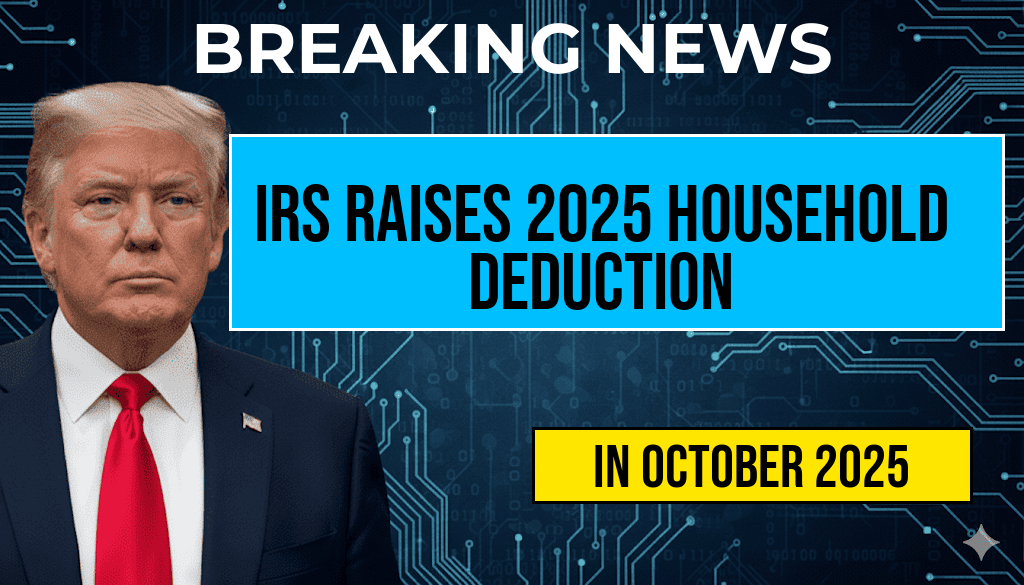The Internal Revenue Service (IRS) has announced that the standard deduction for heads of household will increase to $22,500 in the 2025 tax year, representing a rise of $600 from the previous year’s figure. This adjustment, part of the annual inflation indexing process, aims to ease the tax burden for qualifying taxpayers who file as heads of household, reflecting recent inflation trends. The increase is part of the IRS’s broader effort to keep tax parameters aligned with economic shifts, ensuring taxpayers benefit from updated thresholds that accommodate rising living costs.
The change was formally published in the IRS Revenue Procedure 2024-XX, which outlines various inflation adjustments for the upcoming tax season. Tax experts note that this modest increase could have significant implications for millions of taxpayers who qualify under this filing status, potentially influencing their taxable income calculations and eligibility for certain deductions and credits. For context, the standard deduction is a fixed dollar amount that reduces the income on which a taxpayer is taxed, simplifying the filing process and reducing reliance on itemized deductions.
Understanding the Significance of the Increase
What Does the Standard Deduction for Head of Household Mean?
- Filing Status Eligibility: The head of household status is available to taxpayers who are unmarried or considered unmarried on the last day of the year, maintain a household for a qualifying person, and meet other criteria.
- Tax Relief: The higher standard deduction helps reduce taxable income, which can lead to a lower overall tax bill for eligible filers.
- Impact on Tax Planning: An increase in the deduction amount can influence tax planning strategies, including decisions about withholding and estimated tax payments.
Comparison with Previous Years
| Year | Standard Deduction | Increase from Previous Year |
|---|---|---|
| 2023 | $19,400 | – |
| 2024 | $21,900 | $2,500 |
| 2025 | $22,500 | $600 |
Implications for Taxpayers and the Broader Economy
Taxpayer Benefits and Considerations
The incremental increase in the standard deduction for head of household filers provides tangible relief by reducing taxable income, especially for those with modest earnings. For many, this adjustment could mean the difference between owing taxes or receiving a refund. It also simplifies the filing process, as more taxpayers may opt for the standard deduction instead of itemizing.
Tax professionals suggest that this adjustment might lead to slight shifts in tax liability calculations and could influence the thresholds for certain credits, such as the Earned Income Tax Credit (EITC) and Child Tax Credit. Those who qualify should review the updated figures when preparing their returns or consult with tax advisors to optimize their filings.
Inflation and Policy Considerations
The IRS’s inflation adjustments are based on the Consumer Price Index (CPI), which has experienced consistent growth over recent years. The modest increase reflects ongoing efforts to balance tax relief with fiscal sustainability. Experts observe that these annual adjustments, while seemingly small, cumulatively have a meaningful impact on taxpayers’ financial planning.
What to Expect Moving Forward
Taxpayers should prepare for the upcoming tax season by reviewing their withholding and estimating their liabilities in light of the increased deduction. The IRS has also announced updates to other tax parameters, including the standard deduction for other filing statuses and various income thresholds for credits and deductions, all adjusted for inflation.
For more details on the IRS updates and guidance on how to adjust tax planning strategies, visit the official IRS website at irs.gov. Additionally, consulting reputable tax resources, such as Forbes or the [Wikipedia page on Standard Deduction](https://en.wikipedia.org/wiki/Standard_deduction), can provide valuable context and insights.
Frequently Asked Questions
What is the new standard deduction for Heads of Household in 2025?
The standard deduction for Heads of Household in 2025 has increased to $22,500, which is an increase of $600 from the previous year.
When does the new 2025 standard deduction take effect?
The updated standard deduction amounts for 2025 will apply to tax returns filed in 2025 for the tax year 2024.
How does the 2025 standard deduction compare to previous years?
The $22,500 deduction for Heads of Household in 2025 represents a $600 increase from 2024, reflecting inflation adjustments and tax policy updates.
Who qualifies as a Head of Household for the 2025 tax year?
To qualify as a Head of Household in 2025, you must be unmarried or considered unmarried on the last day of the year, pay more than half the cost of maintaining a home, and have a qualifying person live with you for more than half the year.
Are there other tax benefits associated with filing as Head of Household in 2025?
Yes, filing as Head of Household typically offers a higher standard deduction and more favorable tax brackets compared to single filing status, which can result in lower overall tax liability in 2025.






